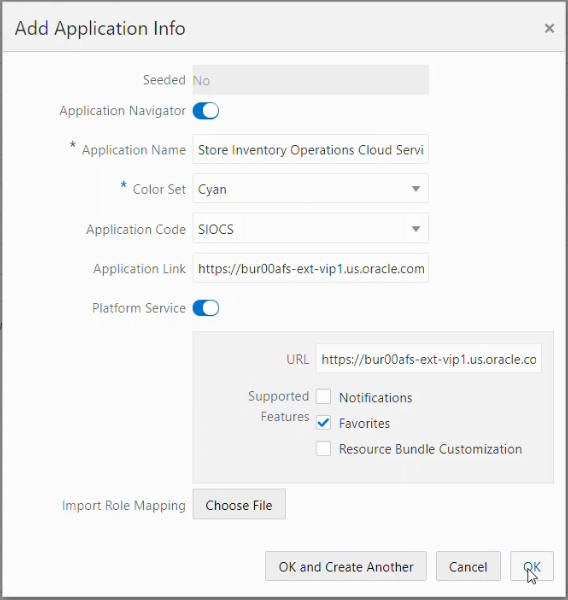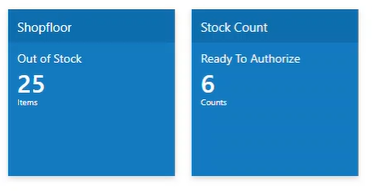2 Retail Home Integration
EICS now supports following integration scenarios with Retail Home:
-
Launch SIOCS web client from Retail Home
-
Launch SIOCS favorites from Retail Home
-
Display a tile report for items that are out of stock on shop floor
-
Display a tile report for stock counts that are pending authorization
-
Launch detailed operational views in SIOCS web client from related tile reports in Retail Home
Launch SIOCS from Retail Home
Launching SIOCS client requires an entry to be made under the application navigator section of Retail Home. It enables the user to launch SIOCS web client in a new browser tab from within Retail Home. Please refer to Oracle Retail Home Administration Guide for information on how to work with application navigator in Retail Home.
The SIOCS application configuration should look like this:
Figure 2-1 Add Application Info

-
Seeded: Disabled and set to No.
-
Application Navigator: Enable it to launch SIOCS client from Retail Home.
-
Application Name: The name of the application that is, Store Inventory Operations Cloud.
-
Color Set: Any color that you want to allocate to SIOCS.
-
Application Code: Select SIOCS from the drop down.
-
Application Link: The URL of SIOCS web client.
-
Platform Service: Enable it to use Favorites feature.
-
URL: The base URL of the platform services. The URL would be of the form
https://<SIOCS-HOST>/RetailAppsPlatformServices
<SIOCS-HOST> is the same host in Application Link.
-
Supported Features: Check only the favorites feature.
-
The user needs to be part of RETAIL_HOME_ADMIN security group in order to access Application Navigator in Retail Home.
Tile Reports
EICS supports following two types of two metric reports:
-
Shop Floor Out of Stock Items
-
Stock Counts - Ready to Authorize
Adding an application navigator entry for SIOCS will automatically configure EICS tiles on Retail Home.
The data seed features do the following:
-
Creates a custom report for EICS tiles on Retail Home.
-
Creates two tiles from the custom report and maps them to retail_home_users IDCS or OCI IAM application role.
-
The data seed features will also configure tile states for the two tiles and hook them up with EICS end points.
After all the configuration, you should be able to see EICS tiles on the dashboard. They should look like the ones below:
Figure 2-2 Example EICS Tiles

EICS Endpoints
EICS exposes following two endpoints:
Shop Floor Out of Stock Items
This endpoint can be used as a data source for Shop floor Out of Stock tile state.
The response contains information on number of items that are out of stock across all the stores that are accessible to the user.
If the percentage of out of stock items to total items is greater than the Shopfloor Out of Stock Items Critical Percentage system configuration, EICS marks the response as important which displays a '!' mark next to the number on the tile report.
Table 2-1 Shop Floor Out of Stock
| Endpoint | Operational View |
|---|---|
|
https://<eics_external_load_balancer_address>/<CUST_ENV>/siocs-client-services/internal/rhreports/outofstock/shopfloor/tile |
Shopfloor Out of Stock |
Stock Counts - Ready to Authorize
This endpoint can be used as a data source for Stock Count - Ready to Authorize tile state.
The response contains information on number of stock counts that are pending authorization across all stores that are accessible to the user.
Table 2-2 Stock Counts - Ready to Authorize
| Endpoint | Operational View |
|---|---|
|
https://<eics_external_load_balancer_address>/<CUST_ENV>/siocs-client-services/internal/rhreports/readytoauthorize/tile |
Stock Count - Ready To Authorize |
The response payloads of both these endpoints confirm to the two metric payload specifications of Retail Home.
User should be a part of retail_home_users IDCS or OCI IAM application role to access these endpoints.
For convenience, EICS also provides a RETAIL HOME security role that captures security permissions required to access these operational views. The user still needs appropriate functional area permissions to navigate to transaction detail screens.
SIOCS Operational Views
EICS has added following operational views that can be hooked with related tiles:
-
Shopfloor Out of Stock Items
This view gives a store and item level breakdown of the information that is displayed on the tile. The user can look at item level records for each store and navigate to the item detail screen for any store/item combination provided he or she has the required permissions.
This view is available under Operations / Operational Views / Shopfloor Out of Stock menu.
-
Stock Count - Ready to Authorize
This view gives a store and stock count level breakdown of the information that is displayed on the tile. The user can look at stock count level records for each store and navigate to the stock count detail for any store/count combination provided he or she has the required permissions.
This view is available under Operations / Operational Views / Stock Count / Ready to Authorize menu.
Launch SIOCS Operational Views from Tile Report
Launching SIOCS operational views from related tile report requires the tile report to be configured with the URL of the related operational view. Once that is done, clicking on tile report header should open the related EICS operational view in a new browser tab.
Subscription Usage Batch
EICS has added a new batch to extract subscription usage for EICS and SOCS respectively during the subscription period. These extracted metrics are pushed to platform services from where Retail Home displays these on the Application Dashboard screen.
This is a restricted batch which by default is scheduled to run every month. The schedule can only be updated by Oracle.
It can also be run as an Adhoc batch from EICS / Admin / Technical Maintenance / Job Admin / Adhoc Job.